Peter MALONE
Saturday, 18 September 2021 19:45
Big Wednesday
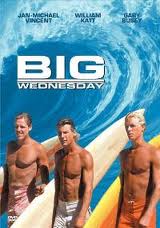
BIG WEDNESDAY
US, 1978, 119 minutes, Colour.
Jan- Michael Vincent, William Katt, Gary Busey, Patti DArbanville, Lee Purcell.
Directed by John Milius.
Writer-director John Milius (Dillinger, Judge Roy Bean, Wind and the Lion, Apocalypse Now) has tried to create cinema myths for America and here daringly takes the surfer of the 60s and 70s as his hero symbol. By showing three friends in selected and significant periods: raucous and adolescent 1962; the conscription phase of 1965; the Vietnam aftermath of 1968 along with its flower counter culture and the more settled adult 1974, he retraces contemporary U.S. history and then has these men face a huge Pacific swell and its challenging waves and test the mystique of the hero surfer alone with his strength, balance and skill and powerfully moving nature. Some magnificent photography, an orchestrated score and strong with U.S. pride and sentiment.
1. The appeal of the film? To the audiences of the 70s especially the youth audience, the surf enthusiasts? The appeal to the adult generation?
2. The contribution of colour photography, wide screen? The importance of the surfing footage and its beauty, excitement, challenge? The Californian and Mexican locations? How well did the film provide a visual and motion atmosphere for its themes?
3. The musical score: the contemporary songs, the orchestrated score and its sense of importance, its background to the waves and the surfing, for the climax when the three men faced the challenge of the big swell?
4. The importance of the structure: the selection of the various years, the moving through the four seasons and the order in which they were presented with the culmination in Spring, the picturing of the sea at the various years, the various seasons with its moods, movements? The climax with Big Wednesday and the title presented on the screen?
5. The importance of the time period covered: twelve years, a period of youthful adolescence and high spirits, the background to the Vietnam was and conscription, the aftermath of the war and the beginnings of the flower movements, the more settled period of the 70s?
6. The film's build-up to Big Wednesday itself? As an ideal, goal, achievement, challenge? A symbol for the whole film and its themes?
7. The narrative devices? The memories of the speaker? The focusing on the points of the memories? The selection? The memories of youth, enjoyment, irresponsible years? The transition to the Vietnam war, youth getting older, the separating and parting of ways? The aftermath and early adulthood, the experience of death and growing older? The transition to middle age, responsibility, a purpose in life?
8. The mystique of surfing? How well did the film communicate it by look, movement, identification? The nature and challenge of surfing, the union of man with water and nature moving? The experience of the waves, their crashing, the pull of the surf, the pounding of the water. the risk and danger? A rugged and individualistic sport? Techniques, skill, fitness? Exhilaration and enjoyment? The surfers becoming youth heroes? The cult of surfing and the surfers? The surfers' community, way of life? The development of the mystique during the 60s? How good were the surfing sequences in this film? The borrowings from surfing films? The panoramas of the beach, of the surfers at work? The documentary of the late 60s on the surfers? The build-up to Big Wednesday, the tide, the moving ocean, the climax? The surfboards and the making of these for the heroes?
9. The visual presentation of water in its beauty, seasons, different weathers, moods? The challenge of water, the dangers?
10. The film as a piece of Americana? The United States setting - could the setting be elsewhere in the world? California? The ethos of the American way of life, youth growing up in America? America and its responsibilities, heroes, symbols and myths? The surfers as mythic heroes? The build-up of the three surfers as heroes? Why were they selected? Their being influenced by their American environment and crises? The build-up to their achievement? Heroes?
11. The three heroes and their introduction, the variety in character, types? Strength, brains, brawn? The bonds between the three? The group to which they belonged? The surfer community and society?
12. Themes of friendship, the nature of the bonds between the three despite their clashes? The strength of the friendship through the years? Their seeing each other, not seeing each other and yet sharing the bonds? This coming together on Big Wednesday? Matt's danger and the others attempting to save him? The sequences of the early surfing, capacities, the rough seas, Matt as hero?
13. The hero-worship of the teenagers on the beach? The bravado of the times, their behaviour in the cafe and the fights, the parties and the smashing up of the house, the intruders, the brawling attitudes in Mexico, driving and on the road? The later attitudes towards this, especially Matt's apologising to Jack's mother? The high spirits of youth?
14. The focus on Matt as hero, his skills, presence? His drinking and sense of inferiority? His weak character? His love for Peggy and their liaison over the years, her pregnancy, the birth of Melissa? The contrast with Leroy and his brawn and brashness, inventiveness? Jack as the typical American, good-looking, pleasant, upright? His good manners? His scenes with his mother and the way that she brought him up? His hosting the party but his trying to behave well? The attraction towards Sally, falling in love with her? His grief at her marriage when he returned from the war?
15. The contrast with Bear and the ageing surfer, his work, his skill in making the boards, his shop? The build-up to his marriage and their sharing in it? His drinking and failing? Matt meting him later and his advising him to play the hero for the teenagers? His becoming a down-and-outer in his middle age? His awareness of the Big Wednesday swell and his sunning the friends? A picture of the has-been surfer, what might have been?
16. The film's attention to detail, the way of life in the community, the cafe, Sally coming from the East, the long party sequence and the fights, the trip to Mexico and the hazards?
17. Jack's story and his growing up, his becoming a lifeguard and respectable, the clash with Matt and throwing him off the beach and punching him, the reconciliation with the drink at the wedding? The bonds of friendship despite everything? His reaction to the accident that Matt caused? The bonds with Leroy over the years? His place in the group?
18. The importance of the Vietnam war, the recruiting and the signing up? The film's presentation of the recruitment centres, the examination of those signing up? The genuine commitment of so many? Jack and his fitting into this American patriot picture? The contrast with the others and their trying to get out - Matt and his lameness, and the tests for this? Leroy and his proving his madness? The others pretending they were sick, crippled, homosexuals? The contrast in spirit and patriotism in the young men of 1965?
19. The importance of the farewell to Jack, the party, the couples, the bonds of friendship and love, the long farewells and embraces? American sentiment?
20. The contrast with 1968 and the aftermath of the war? The greater disillusionment? The hippie movement, flower people, the movements from the East and influences of India in meditation, meals? Matt at work and settling down, his marrying Peggy, Melissa growing up, their going to see the film and the memories of the past and the new heroes? Leroy and his plans?
21. Jack's return and his experience of the war, their joy in seeing him again, Peggy and Melissa at the beach? The visit to the cemetery and the feeling of the three about their dead friends? The funeral and Matt's sympathy?
22. How well did the film pervade the atmosphere with change, age, growing responsibility? Matt and early middle age, his work, wearing glasses? Jack and his business? Leroy and his plans? The contrast with Bear and his being down and out?
23. The film's dramatics with the introduction of Big Wednesday, the swell, the long attention to sequences of the ocean? The significance of the Wednesday? The observers gathering? Matt and his seeking Jack and talking to his mother? The surfers going out with their boards? The build-up to exhilaration? The three friends meeting and going out? The long sequences of the achievement and yet the danger for Matt and his being rescued? The youth on the beach with his surfboard and his admiration?
24. The techniques of the western climax with the focus on the three heroes, their marching together, the swelling music? The presentation of visual mythic heroes?
25. Big Wednesday as an entertaining film geared for youth? As a modern attempt to visualise the American spirit and its heroes?
Published in Movie Reviews
Published in
Movie Reviews
Tagged under
Saturday, 18 September 2021 19:45
Billion Dollar Threat
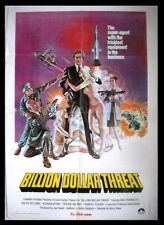
BILLION DOLLAR THREAT
US, 1979, 96 minutes, Colour.
Dale Robinette, Patrick Macnee, Ralph Bellamy, Keenan Wynn.
Direcgted by Barry Shear.
Billion Dollar Threat is low-key small budget imitation James Bond. It is interesting to look at the screenplay and structure of this film to see how the ingredients are always popular but how the James Bond films exaggerate and do everything with panache. Dale Robinette is the low-key hero - imitating Bond. Patrick Macnee enjoys himself thoroughly as the larger than life global ambition for power villain. The explosions and action are somewhat low-key - but it fits into the Jams Bond genre and is an American example of the popular spy story.
Published in Movie Reviews
Published in
Movie Reviews
Tagged under
Saturday, 18 September 2021 19:45
Bill of Divorcement, A
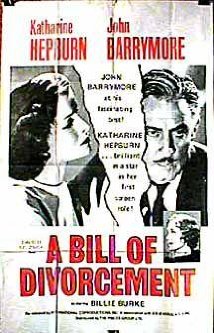
A BILL OF DIVORCEMENT
US, 1932, 76 minutes, Black and white.
John Barrymore, Katharine Hepburn, Billie Burke, David Manners, Paul Cavanaugh. Henry Stephenson, Elizabeth Patterson.
Directed by George Cukor.
A Bill of Divorcement introduced Katharine Hepburn to the screen. It was the beginning of a most successful career with an Oscar in 1933 for Morning Glory, two more for Guess Who's Coming to Dinner and The Lion in Winter in 1967-68. She won a fourth in 1981 for On Golden Pond. Here she was directed by George Cukor who was to direct her in so many films including Little Women, Sylvia Scarlett, The Philadelphia Story, Adam's Rib, Pat and Mike, Love Among the Ruins and The Corn is Green. The film is also a tour-de-force for celebrated stage and screen star John Barrymore. The film, based on a play by Clemence Dane, was refilmed almost exactly in 1940 with Adolphe Menjou and Maureen O’Hara? in the central roles. The themes and treatment seem out of date now but the film is of historic interest for its stars and director.
1. The impact of the film in its time, now? Dated? Based on a play? The atmosphere of drama in the early '30s? The tradition of English drawing room melodramas? A vehicle for its stars?
2. 'Thirties film-making: use of studios, drawing room style? The strength of the cast? The staging and the emphasis on dialogue and the recitation of dialogue? The music and the spirit of the melodrama? The significance and use of the Christmas setting?
3. The introduction to Margaret: tension,, flightiness, her fiance and the prospect of a joyful marriage, Hester's disapproval, Sidney and her support of her mother? The gradual revelation of what had happened in the marriage, Hilary's insanity, the bill of divorcement? The covering up of Hilary's insanity?
4. Katharine Hepburn's initial impact in film as Sidney? Vivid and vivacious? The modern young woman? Devotion to her mother? memories and sympathy towards her father? Her clashes with Hester and her apologies? Her worry about insanity in the family? The romantic scenes with her fiance and the prospect of a happy life in Canada?
5. Themes of propriety., honour, happiness, guilt,, war and suffering.. madness, internment in asylums, release.. healing?
6. John Barrymore's style as Hilary? The audience prepared for his arrival? His dramatic entry. seeing his home again. mistaking Sidney for Margaret? His violent outbursts? His moving in and out of balance? His beginning to appreciate the change, the passing of time? The awareness of something wrong in Margaret? His not liking her fiance? Sidney and her sympathy? The doctor and his trying to soothe Hilary? Soothe him with false promises? Sidney and her reaction to the situation and getting her mother out of it? Her awareness that her father had contrived the situation? Their being left playing Hilary's composition together? Sidney and the emotional effect of meeting her father, concern for her mother, sending her mother away? Her reaction to the doctor's comment on inherited madness? Her breaking with her fiance? Closing herself in the house with her father?
7. Margaret's fiance and his support? Sidney's fiance and his being sent away? Aunt Hester and her melancholic brooding in the family?
8. The doctor and his concern for Hilary, his views about insanity and healing?
9. The touches of the period - the initial party, Christmas and the singers, church-going? The clash with the melodrama of the plot?
10. Musical themes and Hilary's compositions? His composing the end with Sidney?
11. Modern responses to theories of insanity in the family? Relationships. marriage, fidelity? Divorce and the bill of divorcement?
Published in Movie Reviews
Published in
Movie Reviews
Tagged under
Saturday, 18 September 2021 19:45
Bill On His Own
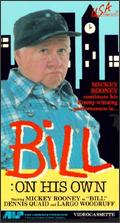
BILL ON HIS OWN
US, 1983, 100 minutes, Colour.
Mickey Rooney, Helen Hunt, Teresa Wright, Dennis Quaid.
Directed by Anthony Page.
Bill On His Own is the impressive sequel to the moving telemovie Bill, starring Mickey Rooney as William. Sacter, a retarded man who spent 44 years in an institution and on his release managed to make his way in his world. This film follows immediately on the original and was made by the same director and crew. The screenplay was written by Barry Morrow, played by Denis Quaid in the film.
Mickey Rooney won an Emmy Award for his excellent performance as Bill. He makes the character come alive. He is just as effective in the sequel. As with the original, the sequel contains footage showing the real Bill Sacter. He died at the time of the making of the sequel.
The film offers a picture of a human being with great personal presence, victimised because of criteria for intelligence, but showing that he had an important place in the world. Denis Quaid makes a guest appearance as Barry Morrow. There is excellent support, especially from Teresa Wright as Bill's landlady. The films offer a great deal of in sight into the plight of those considered retarded.
1. An interesting and engaging sequel? The impact of Bill's character? Situations? The reality of William Sacter? The quality of Mickey Rooney's performance?
2. The prologue highlighting the outline of the first film? The epilogue with the footage of the real William Sacter and the tribute to him? Barry Morrow's writing of the screenplay? The information about Bill's death?
3. The portrait of a human being, a worthwhile human being, an emotional portrait of Bill? Audience understanding? The criterion of intelligence? The nature of wit and wits? Learning? Presence, friendship?
4. Audience response to Bill and the background of the original film?
5. His work in the coffee shop, his success, the faulty connections, the fire, the destruction of the coffee shop, the plea for its rebuilding, the success of the new coffee shop? An achievement of Bill, for Bill?
6. Barry Morrow and his friendship, help? His wife and child? The delightful sequences of Bill with this family and with the child? The visit to California, enjoying the outing, the pier? Barry's decision to help Bill face the facts that he must go back home?
7. Jenny as a typical student, full of good will and theory? Her wanting to help? Tom's warning? Her encounter with Bill, wanting to teach him, her impulsiveness, hard attitude and her having to apologise? Seeing him try to use the phone? Attempts at teaching - and not estimating the way Bill's mind worked? Enrolling him with the school? Taking him to the restaurant, anger about his cap and her insensitivity? Her boyfriend and his anxiety? Her friendship with Bill? Her unwillingness to let him go? Her giving up? The discussions with May and the others? Her presence at his Bar Mitzvah? Her plea to the Board about the rebuilding of the coffee shop? Her return to discuss
her future with him? What she had learnt from her experience with Bill? Her future social work?
8. Tom and his help, warning to Jenny, his presence at the Bar Mitzvah, the plea to the Board about the library or the coffee shop?
9. Bill at home and his friendship with may, friendship with Angela, Ken? The visits of Mrs. Driscoll and the possible eviction? Chasing the dog down the street and the boy's mother warning her son against Bill? His rescuing the dog and the mother's thanking him?
10. The portrait of May, a good woman, her document, the search, Mrs. Driscoll's visit, the visit to her office, the Bar Mitzvah, discovering the document in the Bible? Her joy in having Bill? Angela and her doll, jealousies and rivalry, love for Bill? Ken and his powers of observation, sardonic?
11. Mrs Driscoll and officialdom, decisions, documents? Her afternoon tea visit?
12. Bill as a good man, his own comments about being good? His success? The rules? Portrait of a warm and compassionate man?
Published in Movie Reviews
Published in
Movie Reviews
Tagged under
Saturday, 18 September 2021 19:45
Billy Budd
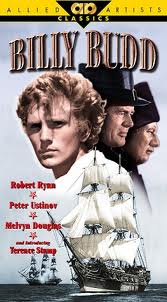
BILLY BUDD
UK, 1962, 125 minutes, Black and white.
Peter Ustinov, Robert Ryan, Terence Stamp, Melvyn Douglas, Paul Rogers, John Neville, Ronald Lewis, David Mc Callum, Lee Montague, John Meillon, Niall MacGinnis?, Cyril Luckham.
Directed by Peter Ustinov.
Billy Budd is a very interesting adaptation of the stage version of Herman Melville's classic novel. The film has an 18th. century naval background and this is brought to the fore for screen effect with Cinemascope and black and white photography. The setting is also brutal and highlights authoritarian situations in which men can be victimised. This is personified by Claggart, portrayed by Robert Ryan. The victim, even Christ-figure in his innocent suffering and forgiveness, is Billy Budd played by Terence Stamp at the beginning of his career.
There is excellent support from a British cast and from Melvyn Douglas. Peter Ustinov is the captain of the ship and he also adapted the screenplay from the play and produced and directed the film. The film rests very strongly on its excellent cast and on the strength of Melville's insight into his situation and the interaction of character. The film is literate, perhaps too literate at times for its vigorous setting. However, it is a film to ponder and discuss.
1. How impressive a film was this? It had an impressive them from an impressive book. Was the film itself equal to these origins? What was the main audience response to the film: to its plot, characters and atmospheres, its themes?
2. How well did the film use the conventions of 18th century naval adventure? The melodrama of life at sea, the clashes between characters on ships? The victimising of innocents? Could an audience respond well merely to these plot details? How would audiences enjoy the film in this way?
3. How well did the film stand as an allegory? Could audiences respond easily to the allegorical nature of the film? How impressive were the details and was it clear what they stood for? The sea as a basis for the world, the microcosm of the sea? The ship and its confinement of characters? The struggle of good and evil? Humanity and the law? The background of biblical quotations and biblical morality? Ordinary men as victims?
4. How well did the film centre Billy? His initial being taken to the ship, his willingness and goodness, his quickly being made victim on the ship, yet his acceptance of his lot and his likable response, his attractiveness and winning over friendship of officers and crew? Goodness basically getting a good response? Yet the evil response of Claggart? The persecution by Claggart and the unwillingness to see the good? Billy's capacity for learning, helping others? The provocation of mutiny? The importance of the encounter before Captain Vere? The impact of Billy's anger and speech impediment? The surprise of his death-blow to Claggart? Billy's status at his trial and his response to the accusations? The edification to those trying him? The human sympathy yet the role of the law? The edifying death? His final call for Captain Vere? How was Billy a salvation figure? A victim of law? A victim of evil? Yet his influence of the men and their ultimate success because they were inspired by him? The Christ-figure overtones of this kind of character?
5. How did Billy stand as almost perfect good? The ideal man? How did Claggart contrast with him as almost total evil? What was salvation in terms of this struggle between good and evil? Is it inevitable that evil conquers? The irony of the good killing the evil? And yet good ultimately destroyed?
6. How evil was Claggart? Was his evil explained? Was it just malign malice? The melodramatic overtones of his evil? The persecution of Jenkins, the persecution and provocation of Billy, the encounter before Captain Vere? Audience response to Claggart's death? Audience sympathy with Billy?
7. The role of Captain Vere on the ship? Playing God with his crew? Impressing men to serve on the ship? An absentee landlord running his ship? A likable person yet distant from the crew? As ineffective in terms of relationships with the men, allowing men like Claggart to rule? His sympathy for Billy and trying to help him? Vere's status at the court case and his attitude towards Billy? His decision to stand for law and order over all instead of the humanity for Billy? Billy's call for God's saving Captain Vere? Audience response to Captain Vere? Was his application of law and justice credible?
8. The role of Jenkins in the film? The first persecutor of Billy, won over (as Claggart was not)? Jenkins becoming Claggart's victim? Billy trying to save him?
9. The role of Ratcliffe on the ship? As subordinate to the Captain, bringing Billy on board, his relationship with Billy during the voyage?
10. The role of Danster in the film? As the ordinary man? The sympathetic man? His support? The biblical wisdom?
11. Comment on the different characters on the ship, their interaction amongst themselves, their relationship with Billy, the effect of Billy on them: Seymour, Wyatt, Kincaid, Squeak, Helen etc.?
12. How was the 18th century and the British navy a good setting for such insight into good and evil, law and justice? The nature of the British navy in the 18th. century, the inhumanity, the standing of law, the horror of mutiny? Was the execution of law too severe? What would happen now?
13. How well did the film explore themes of life and death, the mystery of life, suffering and hardship, the achievement in human life and its influence?
14. Was the film right to be in black and white and Cinemascope, utilising the ship and the sea to make vivid this world in which people were trapped and yet could find salvation?
Published in Movie Reviews
Published in
Movie Reviews
Tagged under
Saturday, 18 September 2021 19:45
Billy the Kid
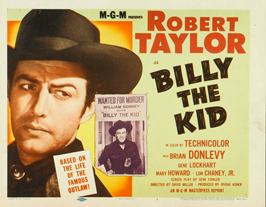
BILLY THE KID
US, 1941, 95 minutes, Colour.
Robert Taylor, Brian Donleavy, Ian Hunter, Mary Howard, Gene Lockhart, Henry O'Neill.
Directed by David Miller.
William Bonney became one of the most celebrated American outlaws of the 19th century west. His nemesis was Pat Garrett. Billy the Kid has been portrayed in a great number of films, starting with Johnny Mack Brown in the silent era and followed by Robert Taylor in 1941 in a beautifully photographed colour western where Taylor was dressed all in black and his foe, Pat Garrett, was renamed Jim Sherwood and portrayed by Brian Donleavy.
Later Billy the Kids include Michael J. Pollard in Dirty Little Billy and Bob Dylan in Sam Peckinpah's Pat Garrett and Billy the Kid.
Audiences are familiar with the stories of the outlaws like Billy the Kid and the James brothers. However, in looking at their careers, audiences are transported back into a lawless west, the role of gunfighters, the need for law and order, the impact of the law of the gun and how the outlaws became folk heroes in the 19th century, which continued on into the films of the 20th century. This film was made just at the outbreak of America's entry into World War II, which shifted the perspective on American heroism. At the same time 20th Century Fox produced Jesse James with Tyrone Power and The Return of Frank James with Henry Fonda.
1. An interesting and entertaining western? A western of the early '40s? The style of westerns at the time? The legends of the outlaws of the west? Their heritage? Questions about what might have been had they lived in other circumstances? "His hour in defiance of advancing civilisation"? Later reassessment of outlaws like Billy the Kid?
2. M.G.M. production values? Colour photography - locations and studio work? The atmosphere of the time with westerns about Jesse James and Frank James etc.? The choice of romantic lead Robert Taylor for the central role? The songs and the score?
3. Audience interest in Billy the Kid? The legend and the captions? The American outlaws? Law and justice in the frontier? Billy the Kid in reality? His reputation? The hero - anti-hero?
4. The film presenting Billy as hero? Explanation of his background, character, opportunities? Law and justice? Yet subsequent history seeing him as mad and off-key? Decisions, shrewdness, stupidity? His motives? His hurt? His being happy to die? The film as valid myth-making?
5. The conventional aspects of the plot: the western town, the outlaws, cattle, justice. corruption, humanity, vengeance, the showdown? Popular ingredients? Yet the problem of the hero/outlaw? Justice and its having to be seen to be done?
6. Robert Taylor's image: age, the opening, Pedro, the bar, Hickey, the rustling and the moral dilemmas, Jim? The lecture by Keating? The encounter with Edith? His going and returning? Ward's support? The possibilities and choices facing him? Death and vengeance? The clash with Jim? Betrayal? The shooting? His being allowed to die? The importance of the memory of the death of his father? Keating as the father-figure? Blame, justice?
7. The sketch of Jim - the older man. friend, father-figure? Relationship with Keating? The confrontation? Help, love, seeming to betray? The brother-figure? The death of Billy - his right hand?
8. Keating as the English gentleman in the west? Edith? Cattle questions? Hickey and the confrontation? Keating's beliefs and his lecture? The shooting? Acting as Billy's father? Support? The death and its effect?
9. Hickey and the smooth villains of the west?
10. Paterson, his death and the reaction of his wife?
11. The popular ingredients of the cattlemen, the rustling, money, violent confrontations? The posse?
12. The place of this western in the development of the Hollywood genre? The film as presenting heroic figures in the atmosphere of the early 1940s?
Published in Movie Reviews
Published in
Movie Reviews
Tagged under
Saturday, 18 September 2021 19:45
Billy Two Hats
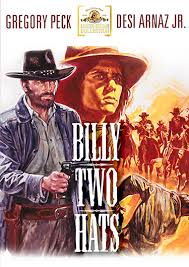
BILLY TWO HATS
UK, 1973, 99 minutes, Colour.
Gregory Peck, Desi Arnaz Jr., Jack Warden, Sian Barbara Allen, David Huddleston.
Directed by Ted. Kotcheff.
Billy Two Hats - audiences still expect their Westerns action-packed. The psychological or character Western has to prove itself quickly to be accepted otherwise it is in and out of the theatres and on the TV sales list. Probably the fate of this film! Directed by Ted Kotcheff (who made Wake in Fright), starring Gregory Peck as a Scots bank robber, Desi Arnaz Jr. as a part-Indian and Jack Warden as a bigoted sheriff, the film has action but also some interesting themes of relationships, Western justice, racism. Filmed with beautiful Israeli desert locations for the West the film is not outstanding, but has much to commend it as a thoughtful and entertaining Western.
1. Did you enjoy this western. Did its plot and treatment seem real? How symbolic a western was it? - relationships of family, father, son, wife? The presentation of the frontier and man lost in the frontier? The migrant and the native boy and their clashes? The racist themes?
2. How well did the film use ordinary western conventions of outlaw, Indian., sheriff, chase. raids. deaths? Did the film enhance the conventions in its use and treatment of them?
3. What did the Israeli location photography add to the film? The style of desert landscapes, the sense of isolation within the desert?
4. How did the opening create tension for the film? The focusing of attention on shooting, on the character of Deans? Did the tension remain throughout the film? and this focus on men and shooting?
5. How interesting a character was Deans? For insight into a man in the west? His outlaw background and robbery background, his Scots nationality and his yearning for the green of Scotland, his skill in the west, his father relationship to Billy, his escaping and coming to rescue Billy? Why? The importance of his being wounded, his ingenuity in eluding the sheriff, his desperation to get away and for Billy to escape? His handling of the Indians and his family finally being destroyed by them? The significance and meaninglessness of his death? His living on in Billy's memory?
6. Was Billy an attractive and interesting hero? As a young man, as a half-breed in the west. his silence and dignity, his being used in robberies, the attitude of the law against him. his being humiliated as a prisoner, being hated by the white sheriff? The contrast with Deans' helping and rescuing him? His dependence on Deans for rescue. Deans' dependence on him for eluding capture? The irony of his not watching for the sheriff? The fact that he was involved with a young girl and not watching? The consequences of this? The ugliness of his being beaten and audience response to this? The compulsion to help Deans? The same compulsion of shooting the sheriff? What future would he have? Esther? Was he intelligible as a character in the west and in these situations?
7. How striking was the presentation of Guillet? As a lawman and obsessed? Brutal in his abuse of the law? His hatred of the half-breed? His despising of him even when the half-breed was praised by Copeland? His continual humiliating and bashing? The inevitability of his death? Was it merited?
8. Copeland and his isolation on the farm. his admiration for the half-breed. the way he shared in the pursuit with Gifford?
9. The presentation of Spencer and his wife? Life on the isolated farm and the risk of death? The relationship between husband and wife? The inevitability of her leaving him and going with Billy? What insight into the hard life of families and work in the west?
10. What comment was being made on whites and half-breeds by the presentation of the Indians? Their foolishness with the clothes and parasol? Their drunkenness? Their being bought off? Yet their fear and cruelty? What made them like this? Did the film show them as victims of white man's exploitation and therefore murdering was their justice?
11. How important were the action sequences? The torture of Spencer and the seige under the cart? The violence of death and shooting? As a just portrayal of the west? The impact of death in this film as part of the expectations of the west? The significance of Billy's shooting through the scarf?
12. What values of humanity, behaviour, relationships, dependence. hatred? Was this
Published in Movie Reviews
Published in
Movie Reviews
Tagged under
Saturday, 18 September 2021 19:45
Biloxi Blues
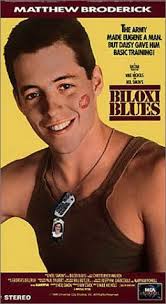
BILOXI BLUES
US, 1988, 102 minutes, Colour.
Matthew Broderick, Christopher Walken, Penelope Ann Miller.
Directed by Mike Nichols.
Biloxi Blues is the second play in Neil Simon's autobiographical trilogy: Brighton Beach Memoirs (film directed by Gene Saks), Biloxi Blues and Broadway Bound. Matthew Broderick re-creates his role from Broadway for the screen. Broderick had appeared in the film version of Simon's Max Dugan Returns. Director of this film is Mike Nicholls, first time film director for a Neil Simon play. Nicholls brings his skills from the theatre and from cinema (Who's Afraid of Virginia Woolf, The Graduate, Carnal Knowledge, Silkwood).
The film is familiar material: young man drafted into the army, undergoing training, eccentric officer, clashes between young soldiers. However, it is done with Simon's wit and humanity. The audience gets a vivid impression of this group of men, life in the Mississippi camp, tensions between the men -as well as a film about an adolescent's rites of passage. Christopher Walken is good playing, low-key, the eccentric and sometimes manic officer.
Brighton Beach Memoirs is rather low-key in its presentation of Eugene Jerome (the stage name for Simon) and his home years. The use of Panavision, the opening out of the play and Matthew Broderick's presence make Biloxi Blues an effective Neil Simon film.
1. The popularity of Neil Simon and his plays? Wit? His autobiography? American material with universal appeal?
2. The opening up of the play, Mike Nicholls and the use of Panavision, the train, the camp, Biloxi? The bridge at the opening and the ending? Musical score, the songs of the period and played blues-style?
3. Neil Simon and his writing skill, creation of characters and situations, wit? Jewish background, Brooklyn? The aspiring author, success? The film as a memoir - his voice-over? Matthew Broderick playing the role?
4. The title: Mississippi, army camp, 1945? Blues in the South for the man from the North?
5. The introduction: the train, the group in the train, the army, drafted, young men? Wykowski and his boorish manner, Arnold and his illness, the food, sleeping, talking jokes? One-liners? Introducing the characters? Audiences sharing Eugene's view of them?
6. The arrival at camp, Sergeant Twomey, picking on Eugene and making him the scapegoat, his use of push-ups as punishment, dormitory sequences, finishing their food, the forced marches, wading the river, the usual drill and training?
7. The group working together, their effect on each other, friendship and hostility? Talk? The long sequence of their telling their fantasies about their last week on earth - revelation of each's character? Overheard by Twomey? The Jewish prejudice? Getting Eugene's diary and reading it? The question of the stealing of the money and the accusations of Arnold? Eugene revealing his attitudes towards the others? Heroism or not, Arnold and homosexuality? The effect on him of their reading his work? His wanting to destroy it but Arnold telling him that lie had a right to his own thoughts?
8. Their going on leave, Arnold and the stealing of the money, the discussion about homosexuality, the sequence with the two men and one escaping through the window? Audience response to Hennessey, his being found out? The effect on him? - and the fantasy of his spending his last time with his family? Going to town, following the girls, the brothel, the men's nervousness, Wykowski and the other man and their brashness, Rowena as the mother-earth type, helping Eugene, the reactions, shyness?
9. Rowena and Eugene, her encouragement? Meeting Daisy at the dance, the nun supervising, friendship with Daisy, falling in love with her, their meetings, her place in his memoir?
10. Wykowski and his brutishness, the friends following him, anger and hurting each other? Hennessey and his supporting both Eugene and Arnold? Arnold and his differences? The challenge about Jewish prejudice? Humour?
11. Twomey and his manner, the plate in his head, background in the war, drilling and harshness, making Eugene the scapegoat, taking the money to teach Wykowski the lesson, Arnold owning up to it, the homosexuality incident and his point about the men? His being drunk, the gun, being reprimanded by the book? His disappearance - and their longing for his eccentricity?
12. The morale of the men, the war, the prospect of going to Europe or the Pacific, their training, watching the Abbott and Costello film, the contrast with the Movietone News and the visualising of death?
13. The end of the war and its effect on them? Eugene's comments about what happened to each of them - predictable or not? His memoir of those who had died in the war?
14. The glimpses into Neil Simon's life, insight into him, his experiences, the value of the diary and its helping him write this play and his understanding of human nature?
Published in Movie Reviews
Published in
Movie Reviews
Tagged under
Saturday, 18 September 2021 19:45
Birth of the Beatles, The
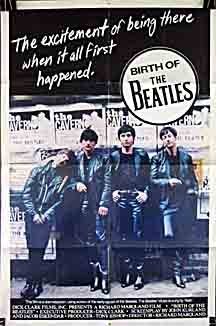
THE BIRTH OF THE BEATLES
UK, 1979, 103 minutes, Colour.
Stephen Mackenna, Rod Culbertson.
Directed by Richard Marquand.
The Birth of the Beatles is a biographical feature made ten years after the group split up. It traces their origins in Liverpool, their early work as a group in Liverpool and Hamburg, Brian Epstein's taking them over as manager, their initial success especially with records and their leaving for their United States tour. The film has actors playing the part and the Beatles songs of that period are vocalised by the group 'Rain'. Not many of the lasting favourites or the almost classical songs are included in this film as they belong to the period immediately following.
The film is interesting in its way, shows a rather ugly Liverpool and ugly Hamburg and the struggle for the Beatles to get going. They were very young, did not have much money, were full of brashness and had to learn by their mistakes. John Lennon emerges as the leader but is rather harsh and ruthless in his leadership especially with the ousting of Peter Best as drummer and the replacement of him by Ringo Starr. (Peter Best contributes to the screenplay of this film.) The other Beatles do not emerge as strongly drawn characters from the film. However, Brian Epstein is well drawn and is shown to be an interesting and complex character - with shyness, organising ability, masterminding the Beatles' success. Attention is given to his homosexuality and presented in a sympathetic light. This raises questions about his personality, his success and his failures and his suicide. The film was directed by Richard Marquand, director of the occult thriller The Legacy.
1. An interesting biographical feature, part of musical history, a tribute to the Beatles and their origins, nostalgia, some explanation of the personalities, their work as a group, their music and success, a phenomenon of the '60s?
2. How well did the film work within the limits of its scope? The flashback from eve of the American tour? The origins in Liverpool and Hamburg, the gradual build-up to success, the development of the music, the limits of the songs included? The beginnings of response and audience knowledge of what ultimately happened?
3. The skill of the actors in impersonating the Beatles, their mannerisms, vocal patterns? Humour? 'Rain' and its reproduction of the Beatles sound? The selection of songs and the way that these were used as commentary and for cabaret work, the finale and the Ed Sullivan Show and 'I Wanna Hold Your Hand'?
4. The world of the '50s and '60s - as focused on the music, the rock 'n roll development, the trends of the '60s and the Beatles being ahead of their time? Groups, playing in cellars, the teenage response? Cabaret in England and Germany? Popularity, concerts? The ambition for recordings? The Beatles' technical skill and execution? Their responding to some need of teenagers for admiration, music? Why did they fulfil the needs?
5. The atmosphere of Liverpool and the way that it was filmed: the urban industrial city, English background, poverty, ugliness? The Beatles and their adolescence, school background, work? John Lennon's aunt and her comments? Lining up for auditions, Stu and his financial support after the success with his painting, his pretending to play? The feeling within the group and the solidarity of the Beatles? The other groups and their success? Ringo Starr and his work and skill?
6. The transition to Hamburg, the ugliness of the city, its night life and the film's concentration on this, the cellars where people met, danced, brawled? The ugly location, closeness to the cinema, the hard and long work? The response of the young audiences? The Beatles and their tiredness, poverty, eating corn flakes, where they lived. being under age., George Harrison being deported, the fire? The later return to Hamburg and success?
7. Stu and his love for Astrid? Her photographs and their look, the collage work? His return to her. his opting out of the group? The bashing in England and its repercussions on his headaches, pill-taking, his collapse and death?
8. Success in Liverpool, the teenagers and the schoolgirls talking, the clamour at the concert? The accident of Brian Epstein and his shop and selling the music, his going to the concert, his intuition about them?
9. The portrait of John Lennon - personality, at home, his aunt, relationship with Cynthia, her pregnancy, marriage? The irony of his later divorce and marriage to Yoko Ono? His aunt and her criticisms, her later visit when he was a success and the implied criticism? His humour, manner of speaking? Friendship with Stu and speech about him after his death? The bond that he created between the Beatles, controlling them? Their asking him to return and lead them? The ousting of Pete Best and his making Brian Epstein do it? The control of the concert and Ringo's success? His relationship with the various Beatles and pushing them? Harsh manner and control of Brian Epstein? The Beatles and their code - and Epstein's reminder that they were a group and not individuals? His ability in leading the group to weld success? His musical skills?
10. The portrait of Brian Epstein - his shop, going to the concert, shyness, the first conversation, the Beatles and their appointment and controlling him, his explanation of his plans, his hopes, hard work and contacts? Gaining the contract? George Martin and success with E.M.I.? The later comment of the press that he was their puppeteer? The background of his homosexuality and the way this was portrayed, his manner, shyness, his being bashed, John Lennon's sympathetic hearing of him and welcoming him into the group? The sadness of his later suicide?
11. The ousting of Pete Best - the impact on Pete, his being hurt, the teenagers and their support of him, Brian Epstein having to handle it for the others, their agreement but not ousting him themselves, the introduction of Ringo and his getting the audience on-side?
12. Success, the party, John Lennon's aunt arriving and looking at the party? John's ordering them out? Talk about being at the top?
13. The American tour, the fans at the airport, British groups not being a success in America, the Ed Sullivan Show and their performance and response? An appropriate place for the film to end?
14. The screenplay and its comments on various people analysing the effect of the Beatles, their appearance, age, hair, clothes? Manner of speaking and humour? Their music, in the rock 'n roll tradition, different? The psychological effect, entertainment value? The phenomenon of the Beatles in retrospect?
Published in Movie Reviews
Published in
Movie Reviews
Tagged under
Saturday, 18 September 2021 19:45
Bite the Bullet
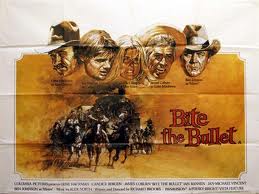
BITE THE BULLET
US, 1975, 131 minutes, Colour.
Gene Hackman, Candice Bergen, James Coburn, Ben Johnson, Ian Bannen, Jan-Michael? Vincent.
Directed by Richard Brooks.
Bite The Bullet looks very good - a beautiful array of Western locations from snowy mountains to blistering desert. It has some good acting, including some moving close-up character speeches from Ben Johnson and Gene Hackman. James Coburn is a pleasant cowboy and Candice Bergen a spirited leading lady. The story is an endurance race of 700 miles in 1906. Some incidents are well thought-out and executed, like the humiliating lesson to the young Jan-Michael? Vincent. Which add up to excellent ingredients for a not-entirely satisfying film. Early continuity is jumpy, the final action twist comes too late. The film is long, and sometimes seems so. Audiences would enjoy it, but not outstandingly.
1. What kind of western was this? Conventional, use of conventions, better than conventions?
2. The film's reliance on colour. varying landscapes, images of the west?
3. The importance of the film being based on fact, the film as history? An exploration of the American heritage? The types of the west? The film's title and its indication of the code of the west?
4. The importance of the film's structure: the race structure, the sense of place, the variety of persons, the interaction of competitors, the difficulties and clashes, the ultimate violence, the winning of the race? How well did this involve audience interest and emotion?
5. How well did the film communicate the experience of adventure: toughness, the riding. the difficulties of the terrain, exhaustion, the competitive spirit, the capacity for survival, endurance, the qualities of the human spirit that keep people going during adventure?
6. How interesting a hero was Clayton? As a type of the west, the initial kindness to the foal, his role as Parker's rider, his relationship with his boss? The human side of Clayton, his tendency to opt out of the race, his dentistry work? His capacity for friendship? His gentleness and wisdom? His friendship with Matthews? His talking to Miss Jones about his family, wife, war experiences? His reactions in the final danger? His decision to walk in? His crossing the line with Matthews?
7. What type of western hero was he? How admirable?
8. The contrast with the mercenary Matthews? Matthews' quality as a hero of the west? His friendship with Clayton? His own self-confidence? His interaction with the other competitors? His persuading Clayton to share the prize? Walking in with Clayton at the end?
9. The contrast with Christie and his work as a rider?
10. The importance of Mister? The old-hand at riding? His story about winning? The pathos of his death? His importance for the themes and issues of the film?
11. Carbo: callow, young, his ignorance, his capacity for violence and clashing, his unwillingness to learn from Clayton, from Matthews? The importance of the sequences in the desert: the death of the horse? The burial? The whipping? What did Carbo learn? His future?
12. The significance of having the Englishman in the race? As a character, as a contrast with the men of the American west?
13. How central was Miss Jones? The initial presentation? The background of the brothel? Her reputation and style? How much of a heroine for the film was she? The good and bad aspects of her character? Her helping and listening to Clayton? The revelation of her role in the prison break? The drama for the chase? Her change of heart?
14. How real was the film? How real were its issues? A romantic picture of the west? The characters of the race as symbols of the west? Adaptations to a changed world? The world of Teddy Roosevelt and 1904, romance and adventure?
15. The importance of visual techniques: the atmosphere of places, the portrayal of people, of the times, trains, towns? The techniques of close-ups, especially for stories, e.g. the story of Mister?
16. How vigorous a western? How soft a western?
Published in Movie Reviews
Published in
Movie Reviews
Tagged under